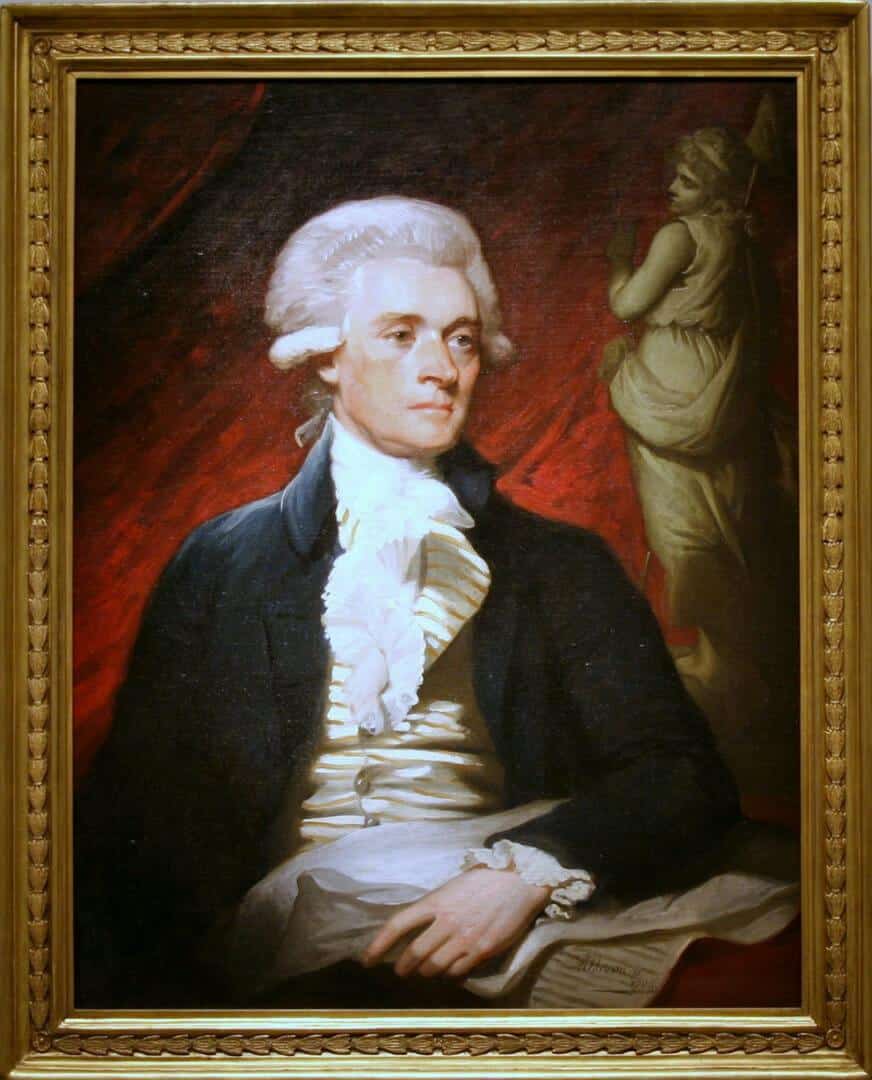Ezra was a model reformer in that what he taught
he had first lived, and what he lived
he had first made sure of in the Scriptures.
—Derek Kidner, Ezra & Nehemiah (1979)
“Come, the New Jerusalem!”

The true story of freedom is the history of the City of God. History began in a Garden. It will culminate in the full manifestation of the New Jerusalem, the City whose Builder and Maker is God Himself (Heb. 11:10; Rev. 21-22). Because this City is a heavenly and transtemporal thing, we see it now only by faith. Like Abraham, we must count ourselves strangers and pilgrims, “for here have we no continuing city, but we seek one to come” (Heb. 13:14). And yet that City is a present reality: “But ye are come unto mount Sion, and unto the city of the living God, the heavenly Jerusalem . . . to the general assembly and church of the first born” (Heb. 12:22ff). In other words, this heavenly Jerusalem is the Christian community in all that God knows and intends it to be. It is real now, but it will come into its own only at the Resurrection when eternity begins.
According to Paul, this heavenly Jerusalem is “free” and is the mother of all God’s true children (Gal. 4:26). Her liberty consists in her freedom from guilt, the curse of the law, the dominion of sin, the power of Satan, and the constraints of Old Covenant shadows and ceremonies (see WCF XX: 1). It includes a bold access to the throne of grace, the possession of the Spirit of God in His fullness, the full revelation of God in Christ, and of Christ in holy Scripture, and the possession of a Gospel that can and will move human history toward the rule of Jesus Christ in all of life and culture.
This, in brief, is the biblical vision of the future. It is easy for us, however, to mistake the mechanisms of God’s plan. The natural man thinks in terms of a religion of power — economic power, scientific power, ecclesiastical power, and certainly political power. When the natural man hears of an eternal fellowship bound together in freedom and love, he thinks of a utopia created and maintained by power — by money, education, psychological manipulation, and external force. Christians are easily tempted to think in the same terms. For this reason, Christians and non-Christians alike are apt to misunderstand and misjudge some of the key figures in Scripture. Noah and the flood, Moses and the plagues, David and his mighty men, all get considerable press. These are great men involved in great things, things that manifestly changed the world, and quickly, too.
But there are quite a few biblical heroes we overlook precisely because their accomplishments seem mundane, unremarkable, and even dull. One such man is Ezra.
Ezra the Scribe
Ezra lived some 500 years before Christ. He was a priest and a scribe. He had “prepared his heart to seek the law of the LORD, and to do it, and to teach in Israel statutes and judgments” (Ezr. 7:10). Somehow he gained the emperor’s favor and a commission to teach the Law of Moses to the people of Israel.
At this time Israel was a small province in the very large empire of Persia. Most of the Jewish people were still scattered throughout its territories. Ezra himself was headquartered in Babylon. But with the imperial commission and the blessing of God, he organized a new support mission for Jerusalem. He collected funds and volunteers all with the emperor’s enthusiastic permission.
The goal of the mission? To teach Israel the law of God. Here are his instructions from the emperor:
And you, Ezra, according to the wisdom of your God that is in your hand, appoint magistrates and judges who may judge all the people in the province Beyond the River, all such as know the laws of your God. And those who do not know them, you shall teach (Ezr. 7:25, ESV).
And so Ezra and his companions set out for Jerusalem carrying offerings for the Temple and Ezra’s well-worn copy of the Torah, the law of God. He had a tremendous vision for Jerusalem. He wanted her to become more fully the City of God.
Ezra’s Ministry: What Rebuilding Really Looks Like
But when Ezra reached Jerusalem, things weren’t at all as he expected. Before he could even begin his ministry, the princes of the people came to him with a huge problem. The people, the priests, and the rulers were marrying heathen wives — that is, women who worshipped idols and who were set on raising their children to do the same. This was contrary to the law of God and, in fact, was the very sin that had brought on the great flood, plagued Israel throughout the days of the judges, and divided Solomon’s kingdom upon his death. Israel’s calling to be a holy people, set apart to God, precluded them making any sort of covenant or entangling alliance with those who served idols and the demonic powers behind them.
When Ezra heard of this gross defection from the covenant, he tore his clothes, plucked out his hair, and sat down astonished and speechless (Ezr. 9:3). Those who feared God slowly began to assemble about him. They were moved, not by his words, but by his heartfelt sorrow and silence. They stood or sat about, waiting.
Finally, when the time came for the evening sacrifice, Ezra rose, only to fall on his knees and spread his hands to heaven. He began to pray: “O my God, I am ashamed and blush to lift up my face to thee, my God: for our iniquities are increased over our head . . .” (9:6).
Ezra confessed Israel’s sins, those present and past. He confessed God’s mercy and goodness in restoring His people to the Land of promise. But he made no appeal for further grace; he simply admitted that “we are before thee in our trespasses; for we cannot stand before thee because of this” (9:15).
As he finished his prayer, a large assembly gathered about him. Together they wept, moved by Ezra’s example. Then one of those present prodded Ezra into action: “There is hope in Israel in spite of this . . . Arise, for thismatter is your responsibility. We also are with you. Be of good courage, and do it” (10:3-4, NKJV). Ezra arose and made the priests and rulers swear an oath that they would make the reforms the law of God required.
The Book of Ezra ends with divorce proceedings and a long list of those who faced sanctions. It seems at first that Ezra completely failed in his mission. We never see him teaching God’s law the way he intended. We see only the negative sanctions of God’s law upheld by Persian civil authority.
But this isn’t the end of Ezra’s ministry. In the next book, Ezra joins the work of Nehemiah, and his teaching becomes the channel for a great revival among God’s people (Neh. 8). Israel is ready and eager to hear the law of God, quick to repent, full of joy for God’s mercy, and ready to confirm His covenant and obey His laws. Ezra and Nehemiah reap the fruit of Ezra’s initial faithfulness.
And there’s more. Ezra wrote the book that bears his name. He also wrote what we know as 1 and 2 Chronicles. Since he wrote Scripture, he was in biblical terms a prophet. Yet his great contribution to the covenant life of God’s people was his emphasis on the infallible word of God. He studied it, read it out loud, taught from it, interpreted it, and judged in terms of it. From his day forward, God’s people became self-consciously the people of the Book.
Ezra’s accomplishments weren’t showy or bloody or catastrophic. In fact, they’re easy to miss. But they changed the world. And history turned a corner toward the New Jerusalem.
Ezra and the Higher Critics
The Higher Critics of the 19th century thought very little of Ezra and recreated him in their own image. Their Ezra invented the Torah or significant parts of it. He compiled long developing traditions, edited them to his religious tastes, and palmed them off on Israel as the law that God gave Israel at Sinai. Their Ezra was a higher critic, a religious innovator, and an ecclesiastical manipulator. He imposed his program on God’s people and called it the law of God.
Of course, there is nothing in Scripture or Jewish tradition to suggest any such thing. Ezra himself wrote of God’s law as a thing given: “the law of Moses, which the LORD God had given” (7:6).
Likewise, the emperor recognized Ezra as “a scribe of the law of the God of heaven” (7:12, 21). He calls the book Ezra has mastered “the wisdom of your God” and says that it contains “the laws of your God” (v. 25). The emperor would have had no reason to promote a religious revolution in Israel and every reason to play to the conservative elements in that province.
When Ezra reached Jerusalem, the people recognized him, not as a religious innovator, but as one who knew and would encourage and enforce “the commandment of our God” (10:3). Their later reception of his ministry was rooted in the example he first set of humility, sorrow for sin, and genuine fear for the people of God. They watched him live out the Torah, and then they were ready to hear him teach it and to respond with repentance and faith.
The Weapons of Our Warfare
Ezra had the emperor’s favor and his financial support. He probably could have received other favors or assignments had he asked for them. The emperor wasn’t limited by a civil constitution or red tape. The Persian kings were despots, bound only by their own decrees and the values of Persian culture.
And yet Ezra didn’t ask for huge alterations in Israel’s political situation. He didn’t lobby for Judean rights, let alone Judean independence. He didn’t ask for a place among the emperor’s counselors. Ezra asked for the freedom and authority to teach the law of God. That is, he asked for Persian recognition of the authority God had already given him. Makes perfect sense as Ezra was a priest, and the priests were supposed to teach the law of God.
We are priests, too, and kings (Rev. 1:6). Reformation and rebuilding doesn’t begin with power politics, anarchy or revolution. Reformation begins with the priesthood of the believer. It begins with God’s people believing, living out, and teaching the law of our God — just like Ezra.
For Further Reading:
Derek Kidner, Ezra & Nehemiah, An Introduction and Commentary (Downers Grove, IL: InterVarsity Press, 1979).
R. Laird Harris, Inspiration and Canonicity of the Bible (Grand Rapids: Zondervan Publishing House, 1969).
Oswald T. Allis, The Five Books of Moses (Phillipsburg, NJ: Presbyterian and Reformed Publishing Company, 1980 [1943]).










